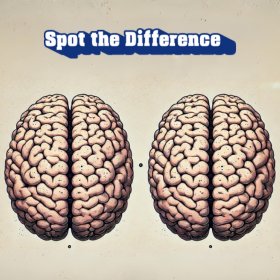Cognitive impairment is a characteristic feature of dementia, but these changes in thinking and memory ability can sometimes be caused by other conditions. In this blog, I’ll be discussing one particular under-recognised condition, functional cognitive disorder (FCD) which is different to dementia but can sometimes be described as mimicking it due to similar clinical symptoms.
Currently, a clinical dementia diagnosis relies on a brain scan, a cognitive assessment, and patient history. However, diagnosing the exact brain disease, like Alzheimer’s, that is causing someone’s dementia isn’t so straightforward. Despite advances in recent years in biomedical research to develop new biomarker diagnostic tests, these diseases can still only be confirmed post-mortem. It’s not uncommon for clinical diagnoses to be reconsidered following neuropathological assessment. So we know that determining the exact neurodegenerative disease(s) causing someone’s dementia whilst they’re alive can be challenging, and may even be incorrect in some cases, but it’s even possible that sometimes people may be diagnosed with dementia when they don’t actually have it.
When someone goes to a clinician, usually a GP, concerned about changes in their thinking or memory, they are likely to be referred to a specialist memory clinic where they will be assessed.
Approximately 25% of people who are assessed in a memory clinic are determined not to actually have dementia but FCD, which shares similar clinical symptoms.
Some people have even been diagnosed with dementia, only to have that diagnosis changed to FCD later down the line. But if dementia and FCD are distinct conditions, how can they be incorrectly diagnosed? The two conditions do have overlapping clinical presentations; that is the changes in cognition which are experienced are comparable, at least in the early stages, meaning performance on cognitive tests may be quite similar. However, a key difference between FCD and dementia is that FCD is not considered to be degenerative, meaning there isn’t a loss of brain cells as we see with the diseases that cause dementia. We therefore wouldn’t expect someone with FCD to have atrophy (shrinkage of brain tissue due to neuron loss), which is often picked up on a brain scan in people who have dementia. With FCD, there’s a problem with how the brain cells are functioning and communicating with one another, rather than there being a progressive loss of these cells over time. This means that there are some key differences between FCD and dementia in terms of how they clinically present, with FCD being more likely to have variability in symptoms, where problems with thinking and memory ability don’t get

A symptom of FND can be numbness, pins and needles, or a feeling that a limb isn’t part of your body. Problems with your memory or concentration can be a symptom of FND.
progressively worse over time as they do with dementia. Instead, they may stay the same, or even fluctuate over time. As part of this, a key clinical feature of FCD is something called internal inconsistency. This is where the change in cognitive symptoms reported by the person experiencing them, do not match the level of cognitive function when tested. For example, certain cognitive functions may be performed easily when done automatically, but if conscious attention is drawn, those particular functions can become significantly impaired. Little is understood about the underlying cause of FCD, but it is generally accepted that dysfunction lies with being able to engage the correct cognitive processes and the brain structures which support them, rather than any physical changes in the brain or the presence of disease pathology.
A diagnosis of FCD should not be one of exclusion, as in solely being reliant on all other possibilities being ruled out. Diagnosis should be of inclusion, where there is positive clinical evidence of a key feature, like internal inconsistency. More research into non-disease causes of cognitive impairment is needed because it is a poorly understood area. The right treatment or therapy aimed at restoring correct function of cognitive processes can significantly improve people’s lives. However, to do this we need to accelerate our dementia diagnostic capabilities to improve both the sensitivity (i.e., correctly identifying when someone has dementia), and specificity (i.e., correctly identifying when someone doesn’t have dementia). Too often we focus on test sensitivity when assessing for dementia, because the earlier someone can be diagnosed, the more effective any treatment or therapy will be, particularly with disease-modifying drugs on the horizon. But test specificity when assessing for dementia is particularly important due to the implications of potentially telling someone they have a progressive condition with no current cure. A proportion of these people may have a non-disease cause of their cognitive impairment, like FCD, which can in many cases be successfully treated.

Dr Kamar Ameen-Ali
Author
Dr Kamar Ameen-Ali is a Lecturer in Biomedical Science at Teesside University & Affiliate Researcher at Glasgow University. In addition to teaching, Kamar is exploring how neuroinflammation following traumatic brain injury contributes to the progression of neurodegenerative diseases that lead to dementia. Having first pursued a career as an NHS Psychologist, Kamar went back to University in Durham to look at rodent behavioural tasks to completed her PhD, and then worked as a regional Programme Manager for NC3Rs.

 Print This Post
Print This Post





